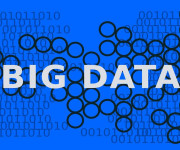How Big Data is Changing the Way Traders Invest

Traditional forms of investment data
Trading decisions have always been based on the best available knowledge of the time, starting with the information about the company such as its history, prospects, and financial statements. Added to this would be information about the current market, including pricing, margins, growth, and debts. These forms of information have been used since trading began and form the basis of a broker’s buying and selling decisions, but now there are new and powerful sources of information adding to the knowledge base.
New forms of investment data
The growth of the Internet and the communication of information it facilitates is key to the use of big data. There are numerous forms of information that can be captured and analyzed according to requirements, including such diverse aspects as web traffic statistics, filings for patents, spoken information such as interviews, information written in other languages, even images taken by orbiting satellites.
How new forms of data are used
When assessing future prospects for potential investment decisions, traders are looking for the businesses with the best combination of attributes to ensure the optimum return on their investment. Its good to buy the stocks like beyond meat shares with good earnings performance and business expansion plans. By gathering all the information they can and using it to calculate the likelihood that a business will do well, traders can make the most accurate decisions and therefore make more gains than losses.
Big data is adding a new dimension to this pool of information, by providing insights that would have been too complex, or too hard to analyze in the past. New forms of technology mean it’s now possible to analyze information that is hard to quantify, unstructured, or disorganized. The key to unlocking the information contained within the quantities of data it’s now possible to collect is the development of high-speed forms of data capture and analysis.
What do investors gain from big data?
All information adds weight to the credibility of the assessment process for a potential investment. For traders, some of the most valuable insight is gained from being able to more readily define specific investment themes that have previously been too hard to quantify, such as momentum. By using big data to provide the information that may not be available to others in the market, you can get ahead of other traders and act to secure profitable investments ahead of your competitors. The more information you have about a prospective investment, the bigger an advantage you have over the people who are basing their decisions on more traditional data sources. The information harvested from big data is used to find new investment factors that assist traders in improving their stock selection and enable them to test their ideas and strategies to inform future decision-making.
People are still the key to sound investing
Data is only a collection of information, and it still needs to be analyzed and assessed by skilled people who can get to the heart of what the information is telling you. The final decisions have to based on human judgment; informed by the data on the one hand and experienced people who have the skills to interpret it on the other.
It’s like having a ton of dirt and sifting through it to find the specks of gold that will make you a fortune. People like Michael Robinson investor extraordinaire have years of experience in mining successfully for the gold amidst the spoil, and these skills are not ones that machines are yet able to replicate.
What does the future hold?
The development of big data analytics is proceeding at an accelerating rate, and it’s expected that as data collection and analysis becomes ever more sophisticated, big data will make an increasingly significant contribution to investing successfully. There are still challenges, particularly in the emerging markets, where there is a lack of data availability. Companies all across the world are entering the emerging markets, but the standards of the information recording and data quality varies enormously from one country to another. That means there are still substantial gaps in the quantity and quality of data that can be used to assess emerging markets.
Like all challenges, the gaps in data availability present an opportunity for traders who possess the experience and analytic technologies to gain an advantage, by monitoring data sources and assimilating as many of them as possible into the knowledge base. The more big data is utilized to gain insights into markets, the bigger becomes the foundation of knowledge on which decision-making is based. In turn, the analysis of the data and decisions based on the knowledge gained can be further analyzed in light of the results of trading decisions, providing evidence that supports or disputes the actions taken.
There’s no telling how influential big data could become for investors in the future, but there’s no doubt it’s playing an increasingly important part in the investment sector. It’s possible that in time technology will develop to the point where computer systems are able to collect, analyze and cross-reference all the information available so efficiently and effectively that the need for human input will dwindle, or even disappear.
If you consider the introduction of investor bots and artificial intelligence to operate the more straightforward aspects of making investments, then combining the two technologies would seem to be a logical progression.
If humans do get replaced by computers, it won’t be any time soon. For now, investments need the guiding hand of human computing power to realize their potential, but change is on the horizon.























